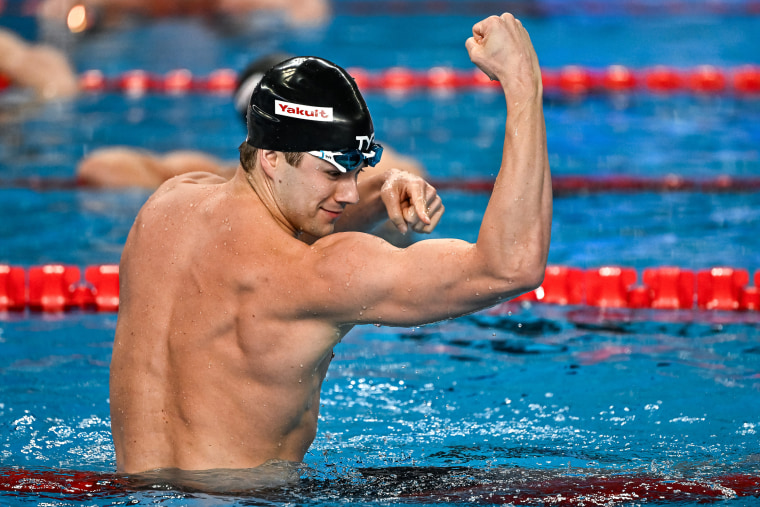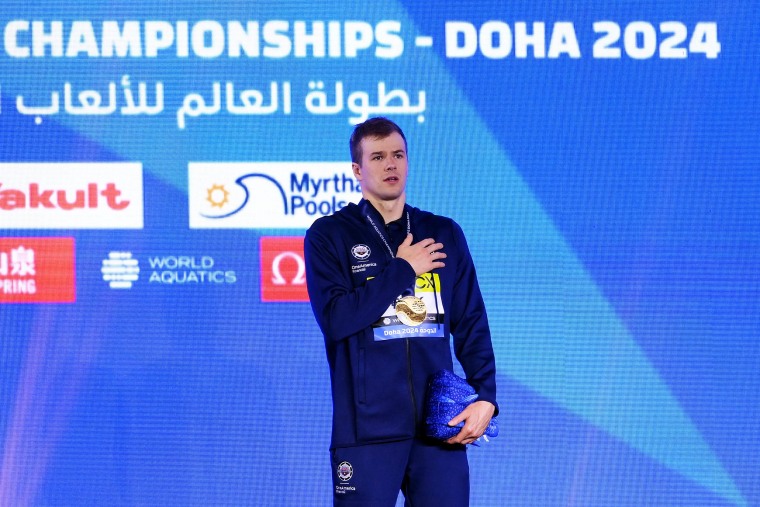Olympic athletes often juggle competing demands on their time and attention. But few competitors vying for glory at the Paris Games have mastered the art of multitasking quite like Nic Fink, a swimmer on the U.S. national team.
In recent years, Fink established himself as a decorated competitive swimmer. He’s a six-time World Championship gold medalist, and he placed fifth in the men’s 200-meter breaststroke event at the Tokyo Olympics in 2021, impressing spectators with his laser-focused intensity.
Then, on Sunday, Fink tied for silver in the men’s 100-meter breaststroke with Great Britain’s Adam Peaty. Italy’s Nicolo Martinenghi won gold.
Fink has done this all while holding down a 9-to-5 job. He has a master’s in electrical and computer engineering from Georgia Tech — a degree he earned after competing in Tokyo — and now works for Quanta Utility Engineering Services, clocking in remotely from the home in Dallas he shares with his wife, Melanie Margalis Fink, herself an Olympian swimmer who won gold in Rio de Janeiro in 2016.
“I thought there was a chance that as I dedicated more time into engineering, perhaps my swimming career would begin to sunset,” he said in a phone interview in April. “But finding that balance has actually helped me in both, and my swimming’s been just as good or better than ever,” he added with a laugh. “It’s been fun to enjoy this part of the ride.”

By most measures, Fink is in the prime of his chlorinated life. He turned 31 on July 3. But in the realm of competitive aquatics, he is also something of a late bloomer, recently delivering some of the most commanding performances of his career at an age when many professional swimmers are preparing to retire.
“I really don’t feel old,” Fink said, “but it’s funny, because we’ll all have meals together as a team, and I’ll sit down and realize there’s a bunch of people who are going through the recruiting process for college.”
“They’ll ask, ‘When did you take your recruiting trips?’ I’ll say, ‘Oh boy, that was 12 or 13 years ago.’ It’s definitely humbling to hear that some of the kids were in third grade when I made my first world team,” added Fink, who was raised in Morristown, New Jersey, and went to college at the University of Georgia, where he majored in electrical engineering.
He acknowledges that he may not be able to train like a teenager, but he doesn’t view that as a limitation in the least. He is increasingly focused on refining his strengths — speed, technique and raw power. He also feels that being in his early 30s has given him more wisdom and emotional maturity about competitive swimming and his place in a demanding sport.
“I think my age has helped me be able to process everything more,” Fink said. “I’m not as reactive … I’m more content with whatever result I have, and knowing that I’ve put my best foot forward and that, at this point, it’s almost like icing on the cake for my career — as opposed to when I was younger, when it was more hunger and drive, but also having to prove myself.”
He wasn’t always convinced he belonged in the pool. “I didn’t really like swimming growing up,” he said. “Early mornings, cold water.” But in time, thanks in part to the “social community” that sprung up around the high school swim squad, he developed the rigor, discipline and self-possession to keep going back into the water no matter how early the wakeup.
In everyday workouts, Fink concentrates intensely on “the mental, the physical, the emotional” demands of performing at an elite level. He aims to complete all that labor in advance so that “when the race comes, you don’t really have to think at all.”
Michael Norment, 49, a University of Georgia coach who has worked closely with Fink, said he has always been impressed by the swimmer’s athletic prowess. But, in recent years, he has been more deeply struck by Fink’s intelligence, forthrightness and commitment.
“Grad school and swimming and traveling and competing — it speaks to his ability to compartmentalize everything that he has going on in his life. I look at him and I’m just amazed. I don’t know many people who can do that,” Norment said.

Fink, who comes across as easygoing and humble, said in April that he was largely focused on Paris and trying not to make sweeping pronouncements about his future as a professional athlete.
“I don’t wanna say anything definitively, but there is definitely a point [where] life beckons and life happens. The call to slow down gets too strong to not answer. I think I’ve certainly heard that call more and more these days, but I don’t like to close the door on anything,” he said. “You just never know. The focus is this summer, and then we’ll see, after that, what’s in store.”
